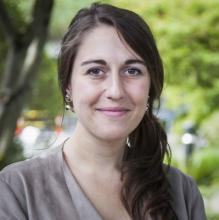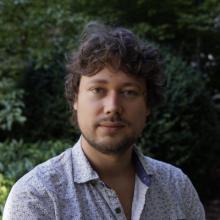Mollie seeks to understand what people care about in relation to the natural world and why. She combines environmental values with ecology to improve conservation programs. Her current work focuses on innovative ways to shift food systems towards sustainability, looking at Payment for Ecosystem Services programs on agricultural lands.
Research Description
Incentives, financial and otherwise, are used across diverse sectors and applications—in business, education, and increasingly in conservation. Yet how do incentives change the way we see our roles and responsibilities? My dissertation research examined a conservation incentive program targeted at farmers in Washington State’s Puget Sound region.
Previous research has mostly focused on farmers as either altruistic conservationists or financially motivated rational actors. My work has identified that a third factor may be essential for the success or failure of incentive programs—the alignment or discord of programs with the ways that farmers relate to and value their land. The next step is to understand the perspective of policy makers—why do programs develop in ways discordant with farmers’ values, despite the availability of feedback from farmers?
My public scholars project will extend my research into the policy arena by engaging a diverse sample of policy makers and stakeholders. Via expert interviews I will aim both to understand the factors policy makers consider as well as to propose, and receive feedback on, novel solutions.
What does being a Public Scholar mean to you?
The questions I ask in my research have always been driven first and foremost by the challenges I see in my experiences working with communities. To me being a public scholar is about listening—listening to the communities and organizations we work with, listening to the public discourse around the issues we study, and listening to the people that will be impacted by our research. This project offers a unique opportunity for me to directly practice my career goal (to work at the nexus of research and policy) with substantial support.
In what ways do you think the PhD experience can be re-imagined with the Public Scholars Initiative?
The Public Scholars Initiative is an excellent opportunity to showcase and experiment with how research and engagement can be combined. By supporting and connecting students the PSI can help encourage broader change to expand the potential scope of the PhD.
How do you envision connecting your PhD work with broader career possibilities?
I plan to work at the nexus of research and policy. The PhD is an excellent time to dig deep into a project and explore big ideas like how to integrate scholarship and public policy work.
How does your research engage with the larger community and social partners?
Much of my work has been inspired by asking my on the ground partners with what issues or problems they struggle. This project is a case in point. I study a conservation program to create riparian buffers on agricultural land. The program is under-subscribed even though it pays farmers. My research has identified concrete reasons why too few farmers are signing up for the program (friction points between the program and farmers), yet two gaps remain: (1) implementation of the recommendations generated by my research (engagement) and (2) understanding more fully why the program ran into friction points with farmers that discouraged participation (research). My Public Scholars project will address both gaps synergistically via interview based dialogue with key policy makers and experts that both presents my previous research and discusses the potential for novel solutions to the problem.
Why did you decide to pursue a graduate degree?
I wanted to better understand the drivers, consequences and potential solutions to global environmental change.
Why did you choose to come to British Columbia and study at UBC?
I found a team of people deeply immersed in the topics that inspire me: human-environment relationships, social-ecological systems, and environmental values.
The PhD is an excellent time to dig deep into a project and explore big ideas like how to integrate scholarship and public policy work.




